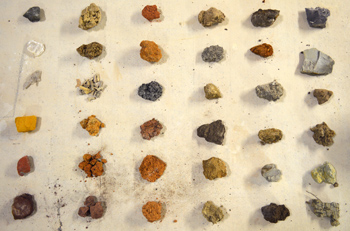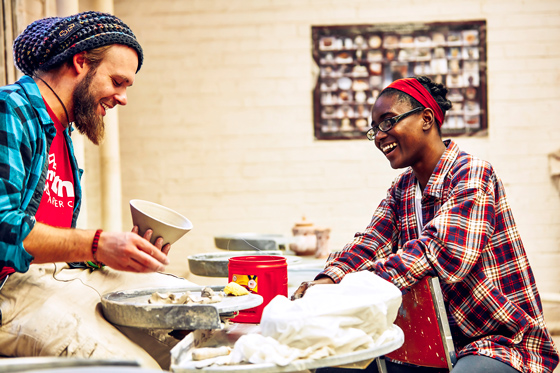Wichita State graduate student Scott Steder is using his graduate research to pursue his passion while creating a priceless resource for Kansas artists.
Steder, who will graduate in May with a master’s degree in ceramics, applied for the highly competitive graduate student fellowship from the National Council on Education for the Ceramic Arts (NCECA) and was one of three students in the country selected to receive the award. His winning proposal focused on locating and testing clays in Kansas.
“My main reason for this whole thing was to create a database of local material for other artists to have access to,” says Steder. “Having that database, people who are interested in using local material can have this more easily accessible tool.”
Steder says he wrote the proposal without truly knowing where it would lead, but was surprised by the diversity in material he found and the abundance and availability of it.
In his research, Steder focused on the plasticity of the clay, the water absorption and the shrinkage. He also worked alongside the WSU chemistry and geology departments to find out what elements were present in the clay and how old it was.

Kansas ceramic material
“I was trying to get very scientific with the research, when at the end of the day I’m super messy with all that stuff,” says Steder. “I think my work is heavily rooted in this idea of discovery and change, so in dealing with these different clays I was able to really explore.”
Many of the clays Steder tested were taken directly from the ground and placed in the kiln with sticks and rocks still attached.
“Being able to use something that’s not commercially produced offered more variables,” he says.
Since he was in high school, Steder has had a passion for ceramics. He hopes to encourage the same passion in students through teaching, which he’s continued through the graduate program at WSU.
He discovered a love for teaching four years ago when he taught 8-14 year olds in the summer at a community college. He now teaches one class each semester in introductory art classes, including 3D Design and Beginning Ceramics.
“I had a great connection with people in terms of trying to teach them something that I loved,” says Steder. “As a teacher, you have to love what you do or what you’re teaching, because that’s the only way I think you can get it across to people.”
Steder’s love for ceramics and dedication to the subject has led to many opportunities to study and travel. Through WSU, he’s gone to Japan, Korea and California to study, and he was able to help build a kiln in Paraguay for a local artist.
“We really get the freedom to explore,” says Steder, “and it’s very educational.”
His exploring fueled his purpose behind the clay database, which he hopes will someday expand beyond Kansas.
“I want to hopefully make an open source for more people to share information,” he says. “There’s just a lot of good material to be used in the ceramic process.”


 Lindsey DeVries
Lindsey DeVries